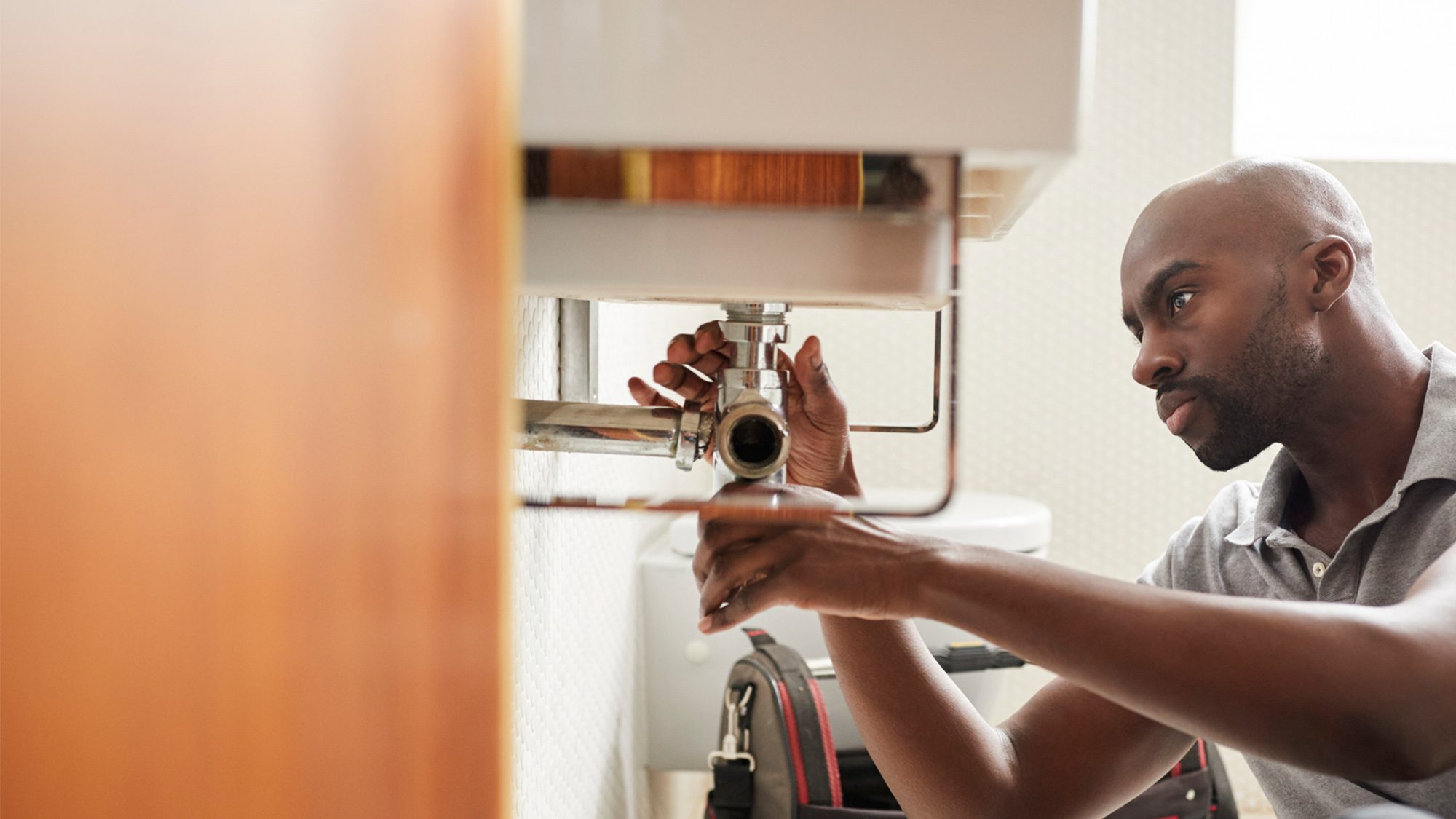
monkeybusinessimages/iStock
The plumbing system in your home is an intricate collection of fixtures, pipes, and valves. Disruptions anywhere in your plumbing system can be problematic for a variety of reasons. Clogged sink drains, leaky faucets, and weird smells can turn your happy home into a hot mess. Your water heater can also present significant issues that can interfere with your daily life. Having to shower at the gym is a lot less convenient than it sounds!
We’ve already covered how to repair some of the most common toilet problems, so in this troubleshooting guide, we’re zeroing in on other plumbing issues that you may encounter as a homeowner.
Here’s hoping you never find yourself up to your ankles in one of the following issues. But if you do, this handy guide is here to help.
Blocked drains
Who hasn’t been frustrated by a clogged drain? However, it’s usually the result of user error.
“Kitchen sinks can become clogged by congealed fats and food remnants, and sinks and tubs can be blocked by knotted hair and soap,” says Don Distel, retail sales manager at Progressive Service Company in Raleigh, NC.
He recommends first using a plunger to see if you can suction the blockage out. Just make sure you use the right plunger.
“There are actually two types of plungers,” he notes. One, shaped like a dome, is for sinks, and the other, which is waisted and shaped more like a bell, is for toilets. Distel favors drain snakes for certain blockages, since they are gentler on the pipes.
Drain cleaner products, such as Drano, on the other hand, can be corrosive if used improperly, Distel says.
“They can cause toilet bowls to crack, PVC pipes to essentially melt, and the glue that holds the pipes together can be eaten away, all of which will leave you with an even costlier repair,” he explains.
Sometimes, your clogged sink may require a more intense intervention, like removing the trap in the pipes. In that case, your best bet is to call a plumber.
Smelly drains
No one likes odors, but plumbing odors are the worst.
“This unpleasant sewer smell is caused by evaporation that leads to dry floor drains that have no water in their P-traps,” explains Benjamin Joseph, co-founder of Liberty Home Guard. “The water in your P-trap is essential for creating a seal that stops sewer gas from rising into your home.”
The easiest way to solve this problem is to check your floor drains from time to time, and if they are dry, Joseph recommends pouring tap water down them to recreate that moisture barrier.
“If the culprit isn’t a dry water trap, there’s a chance that a stinky biofilm has built up inside the offending drain pipe,” says Mark Dawson, COO of Benjamin Franklin Plumbing. He adds that this is more common if you regularly wash food or other biological materials down the drain.
Leaky faucets
Leaky or dripping faucets are problematic for two reasons: They can cause you to waste a lot of money, and that drip, drip, drip sound can drive you bonkers.
“Dripping water is usually caused by a crack in the rubber washer, and sometimes these washers or cartridges are replaceable on older faucets,” says David Moreno, co-founder of Liberty Home Guard. However, on some of the newer faucets, he says there’s a ceramic cartridge, and the entire cartridge must be replaced.
If you are unsure of the parts you need, turn off the flow of water to your tap before taking the cartridge out and take the existing cartridge with you to a local hardware store to see if they have a replacement.
To insert a new washer, simply unscrew the cartridge that contains it, place the new washer in it, and tighten the screw that holds the cartridge together.
Hot water heater issues
If a cold shower is your only option, there could be a few reasons why your hot water heater is on the fritz.
“Double-check your breaker box to be sure your water heater has power,” says Kelson Carter, owner of Carter’s My Plumber in Indianapolis. If that’s not the problem, he says, you need to double-check your water heater tank to make sure it’s not leaking from the bottom.
“You use your water heater every single day, and the heating element in your water heater turns on and off with each use,” says Joseph. “That process causes the minerals in your water to turn into calcium, causing large calcium deposits that will eventually corrode your water heater and cause it to leak from the bottom.”
If the problem is the bottom heater element, Carter says it will need to be replaced, He recommends calling a licensed plumber if you’re not comfortable with repair work.
But if you’ve had your heater for an extended period, it may be time to upgrade.
“In most cases, it’s more economical to purchase a new water heater rather than repairing an old one, as the average water heater is rated for between six to 10 years,” Joseph says.
The post Plumbing Problems: How To Troubleshoot Sinks, Faucets, and Other Water System Issues appeared first on Real Estate News & Insights | realtor.com®.
No comments:
Post a Comment